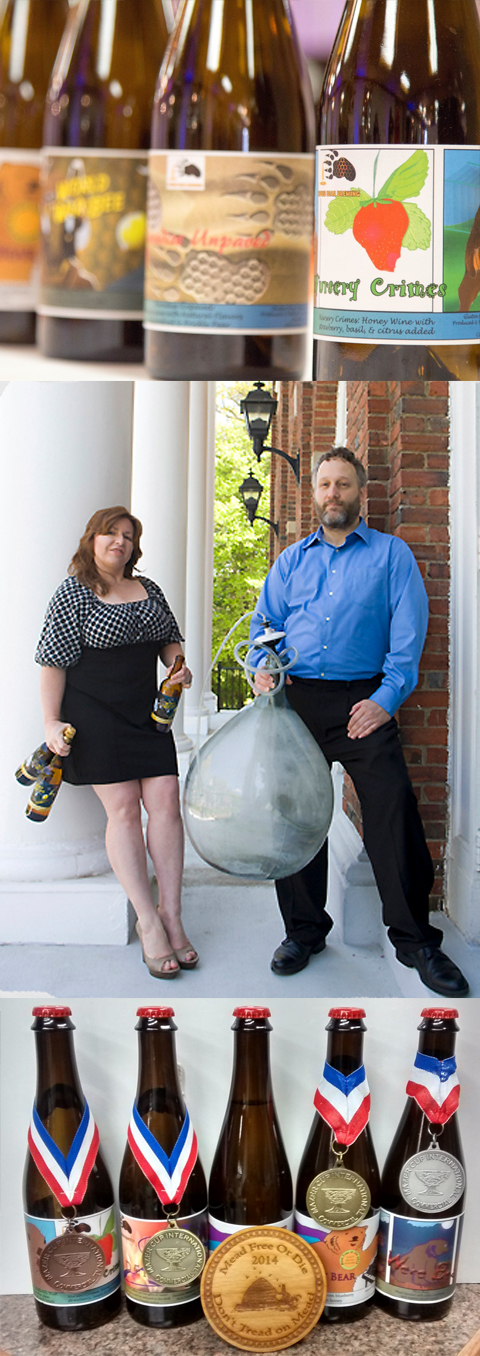Elizabeth Borges, Owner, House Bear Brewing Newburyport, Massachusetts
 As the world’s oldest fermented beverage, mead’s corner of the craft beverage industry has exploded in recent years as fanatics look for products crafted from lost Agrarian traditions. Mead’s illustrious history as the original elixir adds to its allure.
As the world’s oldest fermented beverage, mead’s corner of the craft beverage industry has exploded in recent years as fanatics look for products crafted from lost Agrarian traditions. Mead’s illustrious history as the original elixir adds to its allure.
House Bear Brewing, in Newburyport, Massachusetts, makes half a dozen meads including Paradise Unpaved with The Perfect Purée Passion Fruit Concentrate. Hints of prickly pear and ginger offset the tart notes of passion fruit in a summery mead that pairs well with strong cheese and spicy food.
Often called honey wine, mead’s reputation as a sweet beverage is understandable because of its primary ingredient — honey. But sweet mead isn’t exclusive to the category, as discerning mead drinkers know. House Bear’s owners and ardent mead-makers, Elizabeth Borges and Carl Hirschfeld, uses local honey and high-quality ingredients to make drier meads often described as clean, fresh, crisp, refreshing and light.
“In our research, we found the resistance most people had to mead wasn’t the flavor but the sweetness so we decided to make dry meads,” Elizabeth says. “We’re often told that our meads are very well-balanced.”
House Bear makes traditional meads with honey, water and yeast and ferments them for an extra-long time to achieve its signature dry profile. The process of making flavored mead begins after the first ferment when purées, fruit, herbs, chocolate, hot peppers and other flavorings known as adjuncts are added. The adjuncts initiate a second ferment by giving the yeast more sugar to eat, explains Elizabeth. She says purées makes particularly good adjuncts because of their adjustability.
Her research on purées led her to discover The Perfect Purée, which she singled out because the flavors didn’t have the additives, preservatives or unpronounceable ingredients that she typically likes to avoid.
“We thought they were winners as far as the pure, clean ingredients we were looking for,” she says. “You can taste the difference between a brew that uses extracts and one that uses actual fruits or purées.”
Mead is the forbearer of fermented beverages, likely discovered by accident when some hunter-gatherer ingested honey that had come in contact with water and started fermenting. In time, wine overtook mead in warmer parts of the world where grapes were plentiful but mead remained the fermented beverage of choice in colder climes where fresh fruits and vegetables were preserved in containers of honey and fermented beverages were safer than water.
Elizabeth began drinking mead in college when she and her friends realized they preferred craft beer over Budweiser but couldn’t afford it so started making their own experimental brews.
“We thought it would be cool to learn how to brew but I didn’t want to do what everyone else was doing,” she says.
With the help of friends from medieval re-enactment groups, she joined mead brewing guilds. Her first batch took only three weeks to achieve impressive color, clarity and flavor but she soon learned most brews generally take three months to a year to ferment, plus more time to mellow. Compared to beer and wine, mead requires very little processing but a lot of monitoring.
“I came to learn that mead isn’t so easy and started learning to work through many brewing challenges. Anyone can make mead, but not everyone can make it well because honey doesn’t have the same kind of nutrients for yeast that beer does, so it takes longer. You have to monitor pH, temperature and sugars to be sure you know how happy your yeasts are. You have to baby the ferment,” she explains.
Elizabeth’s interest in mead coincided with its 21st century popularity so she put her business degree to work opening a meadery on the North Shore of Boston.
“I realized we were on the cusp of a craft mead explosion like the craft brew explosion of the ‘90s,” she says.
Along with Paradise Unpaved, House Bear makes World War Bee, a lemonade-style mead that mixes well with bourbon and pairs with fish; Nursery Crimes, a semi-sweet strawberry-basil mead; and other flavorful brews. Since 2013, House Bear’s meads have won three gold medals, a silver and a bronze in competitions, plus numerous mentions in regional publications.
